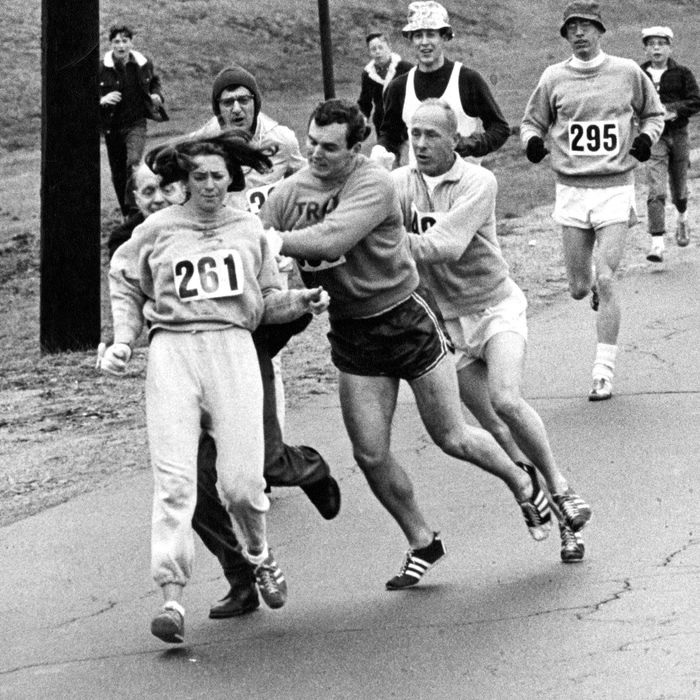A History of Women Protesting in Sports
Since women were allowed to the Olympic Games for the first time in 1990, Paris, the situation with sexism and discrimination in the world of sports has not significantly changed, though. If we follow the history of professional sports, we will realize tons of episodes with women athletes that can not be regarded but as chauvinism. They include all kinds of discrimination from obvious lack of respect, restrictions in terms of participating at different kinds of sports or separate tournaments to the revolting acts of harassment, like it was with Kathrine Switzer in 1967, for instance.

She has entered the Boston Marathon despite the fact the women were not actually allowed to participate. The reasons seemed quite strange for Kathrine: some experts claimed that sports, particularly running, could be harmful for women’s health in some way, including impact on fertility. Such social injustice was something Kathrine could not move on with and she registered for the Marathon, having pretended she was a man. When the truth was revealed, Kathrine was almost finishing — but the official seized her and tried to take her away from the race. However, he was not successful and Kathrine Switzer became the first woman to have finished the race in the Boston Marathon. This was humiliating, from the one hand — and productive, from the other, as a couple of years later, women were officially allowed to the Marathon.
How and what for do athlete women protest
It would be strange to deny that this current state of a woman position in amateur and professional sports is rather dismaying — the lack of equality is still unfortunately obvious, if one looks into this subject a little deeper. However, this, surprisingly, gives women athletes more power — as their votes become louder when it comes to a protest.
This makes the history of women protesting in sports divide into two ways. There is a history of protesting for simply being in sports for women — like the previously mentioned story about Kathrine Switzer. However, the subject appears to be much wider when sports happens to mix with politics and when society needs the voices of minorities to draw as much attention as possible to different issues.
Women, protesting for the women’s rights in professional athletics
It took a long time for women to make a claim of themselves in sports. After the Olympics accepted women categories and became universal, it seemed for some time that no inequality exists anymore. Was it so, though? Definitely not.
First of all, women could not compete in all types of sports that they were actually good at. The tournaments and big events, like the Winter Olympics, for instance, still remained prohibited for them. There are dozens of stories about women who had to hide their gender and pretend to be men to prove their abilities and compete like the other athletes. This was definitely a kind of protest that was making an impact on the world sports industry (very gradually, but still effectively).
Another thing women were fighting for in sports is the salary. The problem of women’s wages is actual for multiple professions and not only sports; but the athlete women have a chance to say their word, being in the spotlight of million fans, journalists and spectators.
Billie Jean King, the star of women’s tennis, is one of the key women activists of the twentieth century. As a founder of the Women Tennis Association, she finally made a difference by first mentioning the need for the equality of the money prizes won in the tournaments. This big deal was finished by Venus Williams, whose influence in Wimbledon resulted in the announcement that women tennis players would start to receive the same money prizes as men.The same thing was done by Meghan Duggan and the National team of the United States for hockey players. It may seem unexpected, but this happened only in year 2017 which is an evidence of the fact that discrimination in sports did not disappear.
In Russia, women boxers went out to the ring and cried out for the change of the fighting rules in order to be allowed to compete with men fighters equally. This did not have an effect yet, though; but it is only the beginning of changing the core rules and policies of Russian Boxing Federation.
Political protests of women in sports
Sport events are sometimes used not for competition — but for the fight for justice. The most well-known episodes of such protests are connected with black women and their voice against racism in the USA. Among the protesting black women are:
- Maya Moore, the US basketball champion
She left the WNBA to protest against the imprisoning of Jonathan Irons and become the voice in changing the justice system of the USA to avoid punishment for the innocent people. This was a high-profile case, highlighted by all American news and popular with betters on the sports betting websites.
- Wilma Rudolf, the US sprinter, 1960 Olympics winner
Wilma was the first person to fight for the racially integrated events and made it real that the parade in her honour became integrated which made change for her hometown
- Rene Montgomery, the US basketball champion
It can be called a protest — leaving the WNBA in order to fight for changing the law and legal system in America. Young, talented athlete woman of great promise leaving her sports career to make a difference in her country — this certainly draws attention and makes the fight more successful.
- Elena Levchenko, the Belarusian basketball champion
For the sake of changes she wanted in the whole political system of her home country, she lost her place in the National team and was arrested; however, this does not seem to stop her and make her fight for human rights silent.
Will athlete women make change?
They did already many times before and, with a strong possibility, will do again and again. An athlete woman has an image of the winner by default — thus, minding their qualities as people who are used to struggle and achieve results, they can do the right things by protesting in their way.













